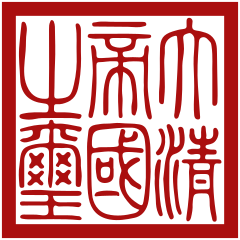La Troisième République en 1909
A French child being taught about the lost province of Alsace-Lorraine,
lost to the Kaiser in the War of German Aggression.
Glorie was always high on the minds of whoever was fated by God to lead France. The Bourbons, the Bonapartes, the Orleanists, the Republic; they had all come and gone and returned. France was eternal, everlasting. Noël Édouard Marie Joseph, Vicomte de Curières de
Castelnau was but one man in a long line stretching back through the ages with a responsibility and duty to see France triumphant. The pre-war "Radical's Republic" was no more, voted out by the people in a wave election. His Premier, Joseph Thierry, was known for opposing laws promoting
laïcité and for generally militant republican rhetoric with a heavy dose of social conservative values. Castelnau sought to broaden his base in anticipation of conflicts with the Left, along with main line Conservatives, Progressists, and pro-Army Bonapratists, he sought to bring Monarchists into the fold as well as rural Conservatives; the objective here being not a desire to turn back the clock to the Ancien Régime but to provide his Coalition with the means to undo the damage the Radical's Republic had done to France.
Many had expected Raymond Poincaré, the darling of the Conservative movement to finally have his time in the sun as Premier. Educated at the University of Paris, Poincaré was called to the Paris Bar, and was for some time law editor of the Voltaire. Extremely ambitious, hard-working, and with a ferocious desire to be the best at everything he did, he become at the age of 20 the youngest lawyer in France and was appointed to the Secrétaire de la Conférence du Barreau de Paris. As a lawyer, he successfully defended Jules Verne in a libel suit presented against the famous author by the chemist, Eugène Turpin, who claimed that the "mad scientist" character in Verne's book Facing the Flag was based on him. At the age of 26, Poincaré was elected to the Chamber of Deputies, making him the youngest deputy in the entire chamber at that time. He had served both as Minister of Education and Minister of Finance in previous cabinets and an important role was expected for him in the new regime.
His reappointment as Minister of Finance, holding also a Deputy Minister of Foreign Affairs portfolio, indicated Castelnau wanted to use his energy to tackle weighty administrative and diplomaitic issues, while at the same time leaving the hard lifting in the Deputies to Thierry. Such an appointment would also have him steer clear in parliamentary debates of that great Radical, Georges Clemenceau, Poincaré's lifelong enemy and a continuing thorn in the Deputies for the Conservative majority. He would also serve as a counter-weight to the actual Minister of Foreign Affairs, Théophile Delcassé; a discipline of Léon Gambetta and an extremely passionate advocate of French expansionism and for
revanche against Germany. His support would be key in holding the loyalty of more aggressive members of the Coalition.
Among the childern of France, there was a deep sense of bitterness, hatred and demand for revenge against Germany, especially because of the loss of Alsace and Lorraine following defeat in the War of German Agression. Even Radicals such as Clemenceau had predicated their opposition to French colonization of the globe for the fact that it would would divert the Republic from recovering the "blue line of the Vosges [Mountains]" in Alsace-Lorraine. After the governments of Jules Ferry had planted a number of colonies in the early 1880s, Clemenceau lent his support to would be dictator, Georges Ernest Boulanger, nicknamed by the periodicals as
Général Revanche, who came close to toppling the Third Republic to punish the Ferry cabinet for their "distractions." This tradition continued to influence French politics and was one of the major reasons France made common cause with her age old rival Russia, resulting in the Franco-Russian Alliance of 1894.
Yet colonies would be very much on the Cabinet's agenda. The loss of Tunisia to Italy was still considered a national scandal and the annexation of Morocco without permission of the Powers by Spain triggered sporadic but serious protests. Premier Therry's note of the prior month had not soothed the people and Castelnau took the unusual step of asking Delcassé to immediately write to his counterpart in Spain to defuse this potential crisis.
Cher Monsieur,
@Olligarchy
Per the written communication of our Premier a few weeks prior, I write to inform you that the Government of France has debated a proper response to the Kingdom of Spain's actions towards the Sultanate of Morocco. We reiterate the Premier's prior complaint that the actions taken towards Morocco by the Armies and Navies of His Most Catholic Majesty are rather devious and rather underhanded. While the cause of spreading Christian civilization is a noble and necessary one, for the longest time Morocco has been a shared responsibility of the Powers, in particular our Great French Republic which has long taken an interest in the Sultan's affairs.
Therefore we would like to propose an equitable distribution of "responsibilities" towards the welfare of the Moroccans at a conference to be held in Paris, and invite the Spanish Council of State to reply to our most humble, most brotherly proposal. We pray it is a favorable reply.
Je vous prie d’agréer, Monsieur, l’expression de mes salutations distinguées,
M. Delcassé















